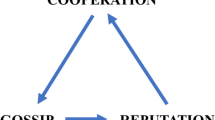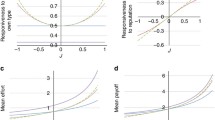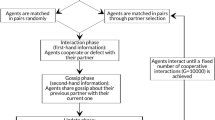Abstract
To find conditions under which humans cooperate within groups of unrelated individuals has been of major interest in the behavioral sciences. The experimental paradigm for studying potential cooperation in social dilemmas is the public goods game. Here humans regularly fail to sustain a public resource cooperatively. However, the need to maintain good reputation for other social interactions, such as indirect reciprocity, has been identified as an effective mechanism to sustain cooperation in public goods situations. As a side effect of building a good reputation through cooperative actions, an individual provides direct benefits to members of his/her own social group. These benefits could be an incentive to reward a good reputation of group members. Here we show experimentally that building a good reputation through cooperative behavior in a public goods situation is rewarded in future social interactions, not only within one’s own social group but also, at a similar level, in other social groups: humans regard cooperative behavior of others as an honest signal irrespective of past direct personal benefits. Reputation gained within as well as outside one’s own social group can be a driving force for selfish individuals to cooperate in public goods situations, and thereby sustain any public resource.




Similar content being viewed by others
References
Alexander RD (1987) The biology of moral systems. de Gruyter, New York
Berkes F, Feeny D, McCay BJ, Acheson JM (1989) The benefits of the commons. Nature 340:91–93
Bolton GE, Katok E, Ockenfels A (2001) What’s in a reputation? Indirect reciprocity in an image scoring game. University of Wisconsin, Working paper. http://www.ise.ufl.edu/scmec/katok.pdf
Boyd R, Richerson PJ (1992) Punishment allows the evolution of cooperation (or anything else) in sizable groups. Ethol Sociobiol 13:171–195
Dawes RM (1980) Social dilemmas. Annu Rev Psychol 31:169–193
Engelmann D, Fischbacher U (2002) Indirect reciprocity and strategic reputation building in an experimental helping game. IEW Working Paper no. 133. University of Zurich
Fehr E, Gächter S (2000) Cooperation and punishment in public goods experiments. Am Econ Rev 90:980–994
Fehr E, Gächter S (2002) Altruistic punishment in humans. Nature 415:137–140
Fischbacher U, Gächter S, Fehr E (2001) Are people conditionally cooperative? Evidence from a public goods experiment. Econ Lett 71:397–404
Fishman MA (2003) Indirect reciprocity among imperfect individuals. J Theor Biol 225:285–292
Getty T (1987) Dear enemies and the Prisoner’s Dilemma: why should territorial neighbors form defensive coalisions? Am Zool 27:327–336
Gintis H (2000) Strong reciprocity and human sociality. J Theor Biol 206:169–179
Hardin G (1968) Tragedy of commons. Science 162:1243–1248
Hardin G (1998) Extensions of “the tragedy of the commons”. Science 280:682–683
Hauert C, De Monte S, Hofbauer J, Sigmund K (2002) Volunteering as red queen mechanism for cooperation in public goods games. Science 296:1129–1132
Hoffman E, McCabe K, Smith VL (1996) Social distance and other-regarding behavior in dictator games. Am Econ Rev 86:653–660
Kramer MK, Brewer MB (1984) Effects of group identity on resource use in a simulated commons dilemma. J Pers Soc Psychol 46
Ledyard JO (1995) Public goods: a survey of experimental research. In: Kagel JH, Roth AE (eds) Handbook of experimental economics. Princeton University Press, Princeton, NJ, pp 111–194
Leimar O, Hammerstein P (2001) Evolution of cooperation through indirect reciprocity. Proc R Soc Lond Ser B Biol Sci 268:745–753
Lotem A, Fishman MA, Stone L (1999) Evolution of cooperation between individuals. Nature 400:226–227
Milinski M, Semmann D, Bakker TCM, Krambeck HJ (2001) Cooperation through indirect reciprocity: image scoring or standing strategy? Proc R Soc Lond Ser B Biol Sci 268:2495–2501
Milinski M, Semmann D, Krambeck HJ (2002a) Reputation helps solve the ‘tragedy of the commons’. Nature 415:424–426
Milinski M, Semmann D, Krambeck HJ (2002b) Donors to charity gain in both indirect reciprocity and political reputation. Proc R Soc Lond Ser B Biol Sci 269:881–883
Mohtashemi M, Mui L (2003) Evolution of indirect reciprocity by social information: the role of trust and reputation in evolution of altruism. J Theor Biol 223:523–531
Nowak MA, Sigmund K (1998a) Evolution of indirect reciprocity by image scoring. Nature 393:573–577
Nowak MA, Sigmund K (1998b) The dynamics of indirect reciprocity. J Theor Biol 194:561–574
Ostrom E (1999) Governing the Commons. Cambridge University Press, Cambridge
Ostrom E, Burger J, Field CB, Norgaard RB, Policansky D (1999) Sustainability—revisiting the commons: local lessons, global challenges. Science 284:278–282
Panchanathan K, Boyd R (2003) A tale of two defectors: the importance of standing for evolution of indirect reciprocity. J Theor Biol 224:115–126
Seinen I, Schram A (2001) Social status and group norms: indirect reciprocity in a helping experiment. Discussion Paper TI2001–003/1. Tinbergen Institute, Amsterdam
Semmann D, Krambeck HJ, Milinski M (2003) Volunteering leads to rock-paper-scissors dynamics in a public goods game. Nature 425:390–393
Semmann D, Krambeck HJ, Milinski M (2004) Strategic investment in reputation. Behav Ecol Sociobiol 56:248–252
Trivers RL (1971) Evolution of reciprocal altruism. Q Rev Biol 46:35
Wedekind C, Braithwaite VA (2002) The long-term benefits of human generosity in indirect reciprocity. Curr Biol 12:1012–1015
Wedekind C, Milinski M (2000) Cooperation through image scoring in humans. Science 288:850–852
Acknowledgements
We thank the students at the universities of Kiel, Bonn and Hamburg for their participation; T. Bakker, H. Brendelberger, E. Heinz and K.-P. Sauer for support; the Max-Planck-Institute of Meteorology Hamburg for hospitality, and I. König for calculating the binary logistic regression model. We thank the referees for insightful comments. The experiments described in this paper were conducted in accordance with local and federal laws in Germany.
Author information
Authors and Affiliations
Corresponding author
Additional information
Communicated by T. Czeschlik
Rights and permissions
About this article
Cite this article
Semmann, D., Krambeck, HJ. & Milinski, M. Reputation is valuable within and outside one’s own social group. Behav Ecol Sociobiol 57, 611–616 (2005). https://doi.org/10.1007/s00265-004-0885-3
Received:
Revised:
Accepted:
Published:
Issue Date:
DOI: https://doi.org/10.1007/s00265-004-0885-3




